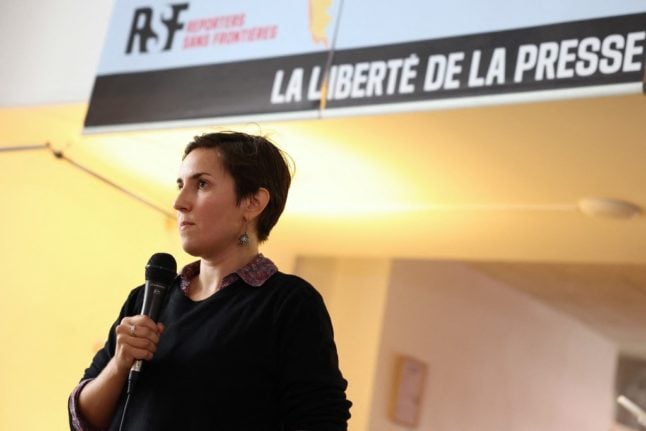“They searched my home, and in particular the tools of my work, my computers, my telephone and my USB keys. They used a load of cyber methods to extract the data. Then I was thrown into jail,” she said.
She then spent 39 hours in detention, repeatedly interrogated by agents of France’s DGSI internal security service, for simply, she says, doing her job and reporting on the ultra-sensitive issue of France’s military cooperation with its ally Egypt.
Lavrilleux was eventually released late Wednesday from her detention in Marseille, with no further action taken at this stage. But a former soldier suspected of being one of her sources has been charged and could be put on trial.
Her arrest shocked fellow journalists and activists in France but has also raised new questions about how the government employs controversial laws on issues of national secrecy, in a country that is supposed to cherish the right to freedom of expression.
Amnesty International secretary general Agnes Callamard described the arrest as “chilling” and described it as part “of a wider attack on public interest journalists who attempt to expose the opaque actions of the French intelligence services.”
In an unrelated but parallel incident, police in the northern city of Lille Thursday summoned three journalists from the Liberation daily for questioning over an investigation they had written into the killing of a young man in the region by police.
‘End of journalism’
“If we don’t protect sources, it’s the end of journalism,” Lavrilleux told a news conference in Paris organised by press freedom group Reporters Without Borders (RSF).
“I consider this arrest to be scandalous and profoundly illegitimate. Its only aim was to prevent me and all journalists from doing our work,” she added.
Lavrilleux had in November 2021 authored articles for French investigative website Disclose that alleged a French counter-intelligence operation in Egypt, codenamed “Sirli”, was used by the Egyptian state for “a campaign of arbitrary killings” against smugglers.
The articles, based on hundreds of secret documents, said French forces were complicit in at least 19 bombings against smugglers between 2016 and 2018 in the region. A complaint against the articles was then rapidly filed with prosecutors by the defence ministry.
France has close military cooperation with Egypt under President Abdel Fattah al-Sisi, who opponents accuse of arbitrarily jailing opponents.
Disclose said the DGSI agents had also interrogated Lavrilleux about articles dating back to 2019 over France’s arms sales abroad.
On Wednesday, while Lavrilleux was still under arrest, government spokesman Olivier Veran repeatedly refused to answer questions on the issue.
“The nature of your question is not suited to the context,” he told a journalist who asked him after a cabinet meeting “if it is normal that a journalist spends a night in a cell in a democracy?”
‘Sword of Damocles’
Disclose, which was founded by two investigative journalists in 2018 and relies exclusively on donations to keep its free access site going, said that the DGSI’s intention was to identify the sources used for stories that had embarrassed the authorities.
France’s law on press freedom after a 2010 amendment states that “the secrecy of sources cannot be directly or indirectly infringed”, unless “an overriding imperative of public interest justifies it”.
Yet violating the law against revealing state secrets can lead to convictions of up to five years in prison and fines of 75,000 euros.
Christophe Deloire, the head of RSF who also leads a presidency-appointed commission on press freedom that starts work next month, said the secrecy of sources was one of the “conditions” of press freedom and the case of Lavrilleux showed the current law had to be worked on.
While Lavrilleux has not been charged, she says she still has this “sword of Damocles” hanging over her head.
“We have now seen it is possible to detain a journalist, that line has been crossed, so why not cross the line of charging a journalist?” she said.
“As a former correspondent in Egypt I was relieved to avoid being jailed under that dictatorship. But it’s ultimately my own country France which tracked me down and arrested me for my work.”



 Please whitelist us to continue reading.
Please whitelist us to continue reading.
Member comments